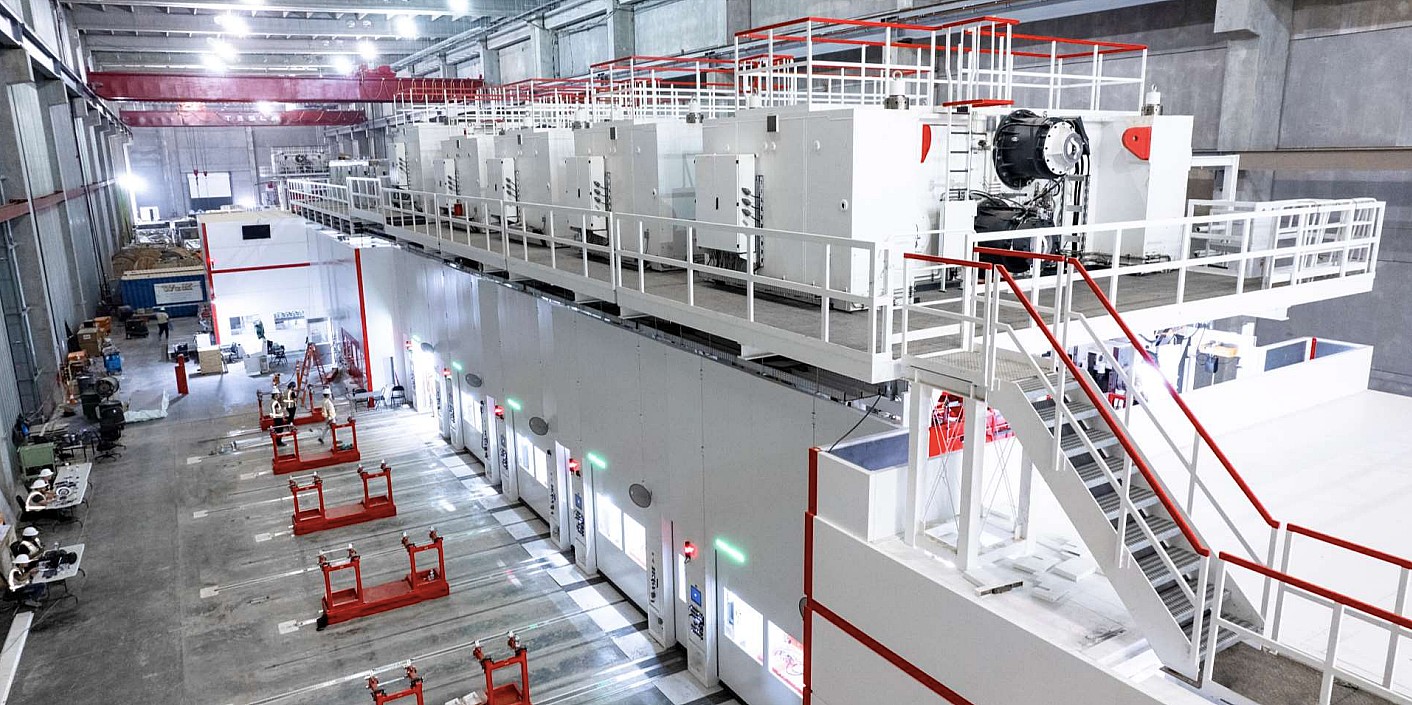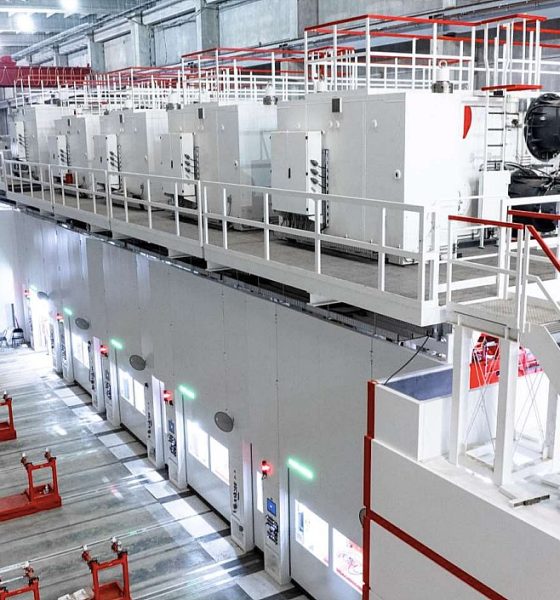

Investor's Corner
Jefferies raises Tesla (TSLA) price target to $950 over strong demand, growing capacity
Tesla stock (NASDAQ:TSLA) recently received an optimistic outlook from Jefferies Equity Research, with analyst Philippe Houchois raising his price target on the automaker from $850 to $950 per share. Jefferies cited several reasons behind its update on TSLA stock, though the analyst noted that part of it is due to the growing gap between Tesla and legacy OEMs.
“We raise EBIT estimates 7-9% for 2022-23 and PT to $950 on higher capacity ramp and sustained demand, following further analysis of Q3 data and various sources of information on the soon-to-be-launched Berlin facility. For some time, the narrative has been legacy OEMs closing the gap; we see little evidence as Tesla continues to challenge at multiple levels. We raise EBIT and margin estimates in contrast with doubts about earnings momentum across legacy OEMs,” Houchois wrote in a note.
The Jefferies analyst noted that the demand has so far been stable for Tesla, and the company’s production capacity is getting better too. With strong demand and an ability to produce more of its products, Tesla could cater to substantially more consumers in the near future. Houchois estimated that even with a linear ramp, the addition of Giga Berlin and Giga Texas should add at least 500k units of actual capacity in one year. The analyst also noted that considering China’s recent results, concerns about domestic demand in the world’s largest EV market might be overblown.
“We make minor changes to 2021 delivery estimates (910k), calculating production exit run-rate of 1.1m, and raise 2022-23 volume to 1.3-1.7m units. Modeling a linear ramp-up of production at the low end of guided 5-10k units/week for two similarly sized new facilities in Austin and Berlin, Tesla is set to add at least 500k units of actual capacity in one year to 1.6million and a solid 200-250k of actual units in 2022.
“The final details of Q3 also showed China domestic sales of 73.6k units, putting to rest concerns about domestic demand, while annualized Q3 output yields 530k, i.e., Shanghai running at more than full capacity. Ytd Tesla delivered slightly more units than produced despite a still “immature” production network with cross-continent shipping accounting for c.20% of total production. Localizing production should improve delivery timing and associated transit costs,” Houchois wrote.
Apart from these, the Jefferies analyst noted that based on the information it could gather from Giga Berlin, the plant seems to be heavily designed for simplicity. This should make it easier for the company to produce vehicles like the Made-in-Germany Model Y in a manner that is extremely cost-efficient and relatively simple. This, together with Tesla’s capability to weather the chip shortage crisis by adapting its products to what components are available, should allow the company to keep an edge against its peers.
“From the information we could gather on the new Berlin facility, we noted that plant design was heavily flow-driven while the aluminum casting of both front and rear underbodies may reduce by c.40% the number of body-in-white components and robots required for welding and assembly. In a global auto industry plagued by complexity, Tesla continues to reduce complexity and set new standards for simplicity of design and assembly.
“Whilst Tesla has not been immune to supply disruptions in the course of 2021, it has outperformed peers in sourcing semi-conductors. From discussions with a senior expert in semi-conductor sourcing and manufacturing, we understand this partly reflects Tesla in-sourcing chip design with an ability to effect rapid re-design and secure more direct sourcing than peers,” the Jefferies analyst wrote.
Disclaimer: I own TSLA stock.
The Teslarati team would appreciate hearing from you. If you have any tips, reach out to me at maria@teslarati.com or via Twitter @Writer_01001101.

Elon Musk
Tesla stock gets latest synopsis from Jim Cramer: ‘It’s actually a robotics company’
“Turns out it’s actually a robotics and Cybercab company, and I want to buy, buy, buy. Yes, Tesla’s the paper that turned into scissors in one session,” Cramer said.

Tesla stock (NASDAQ: TSLA) got its latest synopsis from Wall Street analyst Jim Cramer, who finally realized something that many fans of the company have known all along: it’s not a car company. Instead, it’s a robotics company.
In a recent note that was released after Tesla reported Earnings in late January, Cramer seemed to recognize that the underwhelming financials and overall performance of the automotive division were not representative of the current state of affairs.
Instead, we’re seeing a company transition itself away from its early identity, essentially evolving like a caterpillar into a butterfly.
The narrative of the Earnings Call was simple: We’re not a car company, at least not from a birds-eye view. We’re an AI and Robotics company, and we are transitioning to this quicker than most people realize.
Tesla stock gets another analysis from Jim Cramer, and investors will like it
Tesla’s Q4 Earnings Call featured plenty of analysis from CEO Elon Musk and others, and some of the more minor details of the call were even indicative of a company that is moving toward AI instead of its cars. For example, the Model S and Model X will be no more after Q2, as Musk said that they serve relatively no purpose for the future.
Instead, Tesla is shifting its focus to the vehicles catered for autonomy and its Robotaxi and self-driving efforts.
Cramer recognizes this:
“…we got results from Tesla, which actually beat numbers, but nobody cares about the numbers here, as electric vehicles are the past. And according to CEO Elon Musk, the future of this company comes down to Cybercabs and humanoid robots. Stock fell more than 3% the next day. That may be because their capital expenditures budget was higher than expected, or maybe people wanted more details from the new businesses. At this point, I think Musk acolytes might be more excited about SpaceX, which is planning to come public later this year.”
He continued, highlighting the company’s true transition away from vehicles to its Cybercab, Optimus, and AI ambitions:
“I know it’s hard to believe how quickly this market can change its attitude. Last night, I heard a disastrous car company speak. Turns out it’s actually a robotics and Cybercab company, and I want to buy, buy, buy. Yes, Tesla’s the paper that turned into scissors in one session. I didn’t like it as a car company. Boy, I love it as a Cybercab and humanoid robot juggernaut. Call me a buyer and give me five robots while I’m at it.”
Cramer’s narrative seems to fit that of the most bullish Tesla investors. Anyone who is labeled a “permabull” has been echoing a similar sentiment over the past several years: Tesla is not a car company any longer.
Instead, the true focus is on the future and the potential that AI and Robotics bring to the company. It is truly difficult to put Tesla shares in the same group as companies like Ford, General Motors, and others.
Tesla shares are down less than half a percent at the time of publishing, trading at $423.69.
Elon Musk
Tesla to a $100T market cap? Elon Musk’s response may shock you

There are a lot of Tesla bulls out there who have astronomical expectations for the company, especially as its arm of reach has gone well past automotive and energy and entered artificial intelligence and robotics.
However, some of the most bullish Tesla investors believe the company could become worth $100 trillion, and CEO Elon Musk does not believe that number is completely out of the question, even if it sounds almost ridiculous.
To put that number into perspective, the top ten most valuable companies in the world — NVIDIA, Apple, Alphabet, Microsoft, Amazon, TSMC, Meta, Saudi Aramco, Broadcom, and Tesla — are worth roughly $26 trillion.
Will Tesla join the fold? Predicting a triple merger with SpaceX and xAI
Cathie Wood of ARK Invest believes the number is reasonable considering Tesla’s long-reaching industry ambitions:
“…in the world of AI, what do you have to have to win? You have to have proprietary data, and think about all the proprietary data he has, different kinds of proprietary data. Tesla, the language of the road; Neuralink, multiomics data; nobody else has that data. X, nobody else has that data either. I could see $100 trillion. I think it’s going to happen because of convergence. I think Tesla is the leading candidate [for $100 trillion] for the reason I just said.”
Musk said late last year that all of his companies seem to be “heading toward convergence,” and it’s started to come to fruition. Tesla invested in xAI, as revealed in its Q4 Earnings Shareholder Deck, and SpaceX recently acquired xAI, marking the first step in the potential for a massive umbrella of companies under Musk’s watch.
SpaceX officially acquires xAI, merging rockets with AI expertise
Now that it is happening, it seems Musk is even more enthusiastic about a massive valuation that would swell to nearly four-times the value of the top ten most valuable companies in the world currently, as he said on X, the idea of a $100 trillion valuation is “not impossible.”
It’s not impossible
— Elon Musk (@elonmusk) February 6, 2026
Tesla is not just a car company. With its many projects, including the launch of Robotaxi, the progress of the Optimus robot, and its AI ambitions, it has the potential to continue gaining value at an accelerating rate.
Musk’s comments show his confidence in Tesla’s numerous projects, especially as some begin to mature and some head toward their initial stages.
Elon Musk
Tesla director pay lawsuit sees lawyer fees slashed by $100 million
The ruling leaves the case’s underlying settlement intact while significantly reducing what the plaintiffs’ attorneys will receive.

The Delaware Supreme Court has cut more than $100 million from a legal fee award tied to a shareholder lawsuit challenging compensation paid to Tesla directors between 2017 and 2020.
The ruling leaves the case’s underlying settlement intact while significantly reducing what the plaintiffs’ attorneys will receive.
Delaware Supreme Court trims legal fees
As noted in a Bloomberg Law report, the case targeted pay granted to Tesla directors, including CEO Elon Musk, Oracle founder Larry Ellison, Kimbal Musk, and Rupert Murdoch. The Delaware Chancery Court had awarded $176 million to the plaintiffs. Tesla’s board must also return stock options and forego years worth of pay.
As per Chief Justice Collins J. Seitz Jr. in an opinion for the Delaware Supreme Court’s full five-member panel, however, the decision of the Delaware Chancery Court to award $176 million to a pension fund’s law firm “erred by including in its financial benefit analysis the intrinsic value” of options being returned by Tesla’s board.
The justices then reduced the fee award from $176 million to $70.9 million. “As we measure it, $71 million reflects a reasonable fee for counsel’s efforts and does not result in a windfall,” Chief Justice Seitz wrote.
Other settlement terms still intact
The Supreme Court upheld the settlement itself, which requires Tesla’s board to return stock and options valued at up to $735 million and to forgo three years of additional compensation worth about $184 million.
Tesla argued during oral arguments that a fee award closer to $70 million would be appropriate. Interestingly enough, back in October, Justice Karen L. Valihura noted that the $176 award was $60 million more than the Delaware judiciary’s budget from the previous year. This was quite interesting as the case was “settled midstream.”
The lawsuit was brought by a pension fund on behalf of Tesla shareholders and focused exclusively on director pay during the 2017–2020 period. The case is separate from other high-profile compensation disputes involving Elon Musk.








